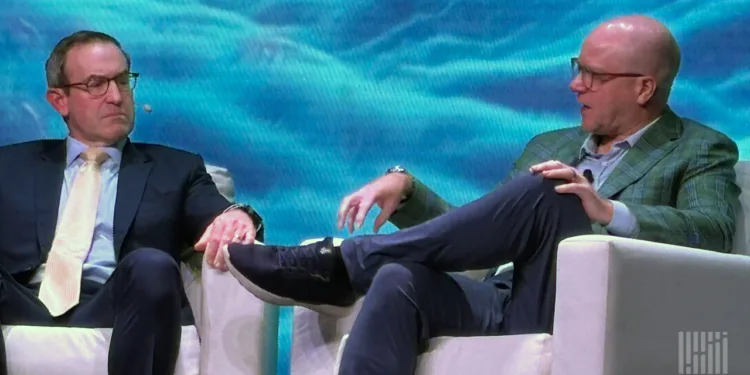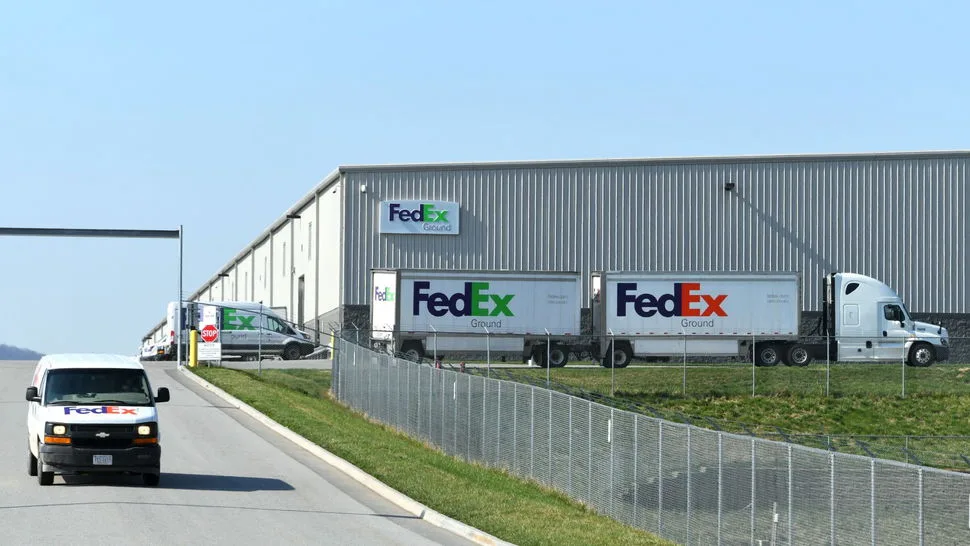CHATTANOOGA–The prevailing idea that the U.S. and China are locked in a trade war is missing the point, according to Leland Miller. What the two countries are engaged in is a war over who controls supply chains and “choke points” for critical products.
At the FreightWaves’ Festival of Freight (F3) conference here, Leland Miller, the co-founder and CEO of China Beige Book International, told FreightWaves and SONAR CEO Craig Fuller during the conference’s keynote that “the most important issue is no longer trade per se. It’s supply chains and who controls key supply chain choke points.”
While the talk has been on tariffs that if fully implemented against China could reach 150%, Miller said the actual tariff rates are no more than 70% on average and they are “quite manageable going forward.”
That brought Miller to what he believes is the key issue in China-U.S. economic relations: supply chain choke points, in critical minerals in general and specifically rare earth elements, vital in numerous high-tech applications. The battle over those supplies have resulted in recent Chinese decisions to limit exports of rare earths.
“China basically said after some pushback in the trade war, no more,” Miller said. “If you keep treating us poorly on the trade side, we are going to start cutting off things you care about, and we start with critical minerals.”
U.S. attempts to launch rare earths industry
The U.S. has long sought to develop a rare earths industry of its own, and has always come up short. MP Materials (NYSE: MP) operates the rare earths mine in Mountain Pass, California, which has passed through intermittent shutdowns and shifting ownership changes over the years, at one point being owned by oil giant Unocal, which was eventually purchased by Chevron (NYSE: CVX). The U.S. government now has a 15% stake in MP.
The U.S. has limited capability to process the ore after it is mined at Mountain Pass, and Chinese refining capabilities give it the ability to squeeze the rare earths supply chain.
That sort of governmental step–owning a stake in a key asset rather than relying on market forces–marks a shift in U.S. thinking, Miller said. “The playbook for years and years, particularly since the 1990’s, has been that markets should control everything,” Miller said. “I think that most of the time, that’s probably a very good idea.”
But that belief can collide with areas where there are “certain security priorities that we can’t allow to be controlled by the markets,” Miller said.
Part of the problem with the current market structure, Miller said, is that China can squeeze the supply chain not by withholding supplies but by making economic returns unpalatable.
“Are we going to wait to try to figure out the perfect economic model so that we can remain profitable in a world in which China controls so much supply that they cut prices, and all of a sudden, these (U.S.) firms go bankrupt?” Miller said.
Earlier attempts to ramp up production at Mountain Pass failed in part because “every time there was a market price for the critical materials, the Chinese would oversupply, the market cut the price, and the U.S. firm would effectively go bankrupt,” MIller said.
That trend is leading to a policy that “there’s certain things that are so important the government has to become part of the equation.”
Price floors loom
Part of that policy could also involve setting a price floor for critical materials like rare earths, Miller said, anathema to a free-market model. Trump’s Secretary of Treasury Scott Bessent already has signaled that the administration would take that approach.
“What we’re learning right now is that we’re going to have to do this in more and more industries,” Miller said. “Don’t get me wrong, if you do this in too many industries, and we are on the verge of doing this in too many industries, you’re going to have a lot of problems too.”
Relying on market signals works “95% of the time,” Miller said. “But what the Chinese model is really, really good at is brute forcing a handful of major priorities and wiping out their competitors.”
People aren’t the focus
Miller made several other observations about the Chinese economy and its leaders. First, Xi Jinping, the Chinese leader, is not particularly concerned about the welfare of individual Chinese families. His pursuit instead is economic dominance in several of those key supply chains, such as rare earths.
Second, waiting for the Chinese economy to suddenly become more domestically focused and move away from an export-driven model is unlikely.
“Chinese households can’t spend more because they are run by a single child,” MIller said, a consequence of the company’s now-discarded single child policy that has had massive demographic impact on the country. “A single child has to pay for all the health care and all the future responsibilities for this entire inverted pyramid of the family. And if you do that, you’re going to be a saver, you’re not going to be a spender.”
More articles by John Kingston
5 Chapter 11 filings in transportation in October’s first 2 weeks
How Triumph’s data reveals owner operator resilience
Demurrage dilemma: court overturns FMC’s trucking rule
The post China expert Miller: why supply chain ‘choke points’ matter most appeared first on FreightWaves.














